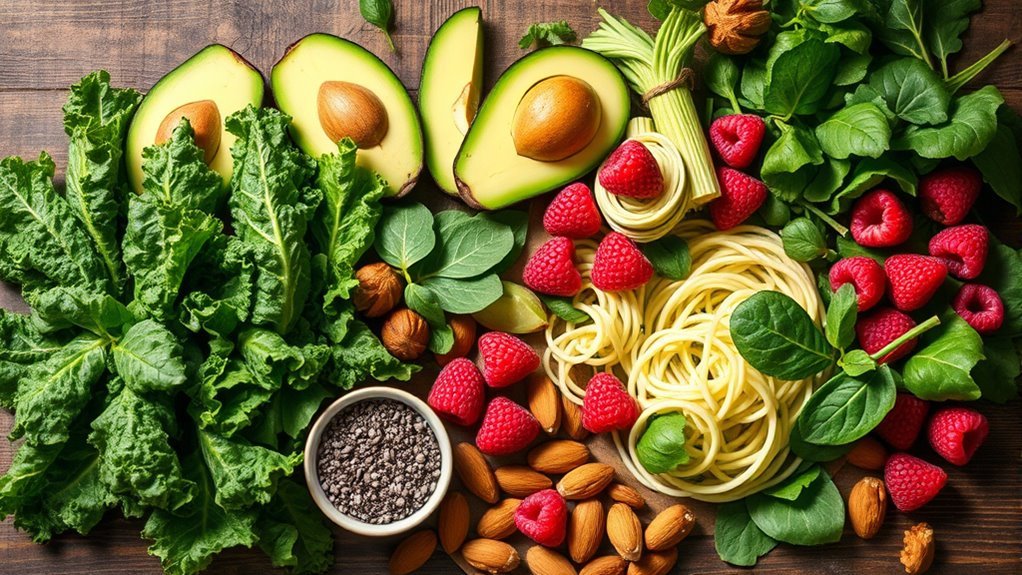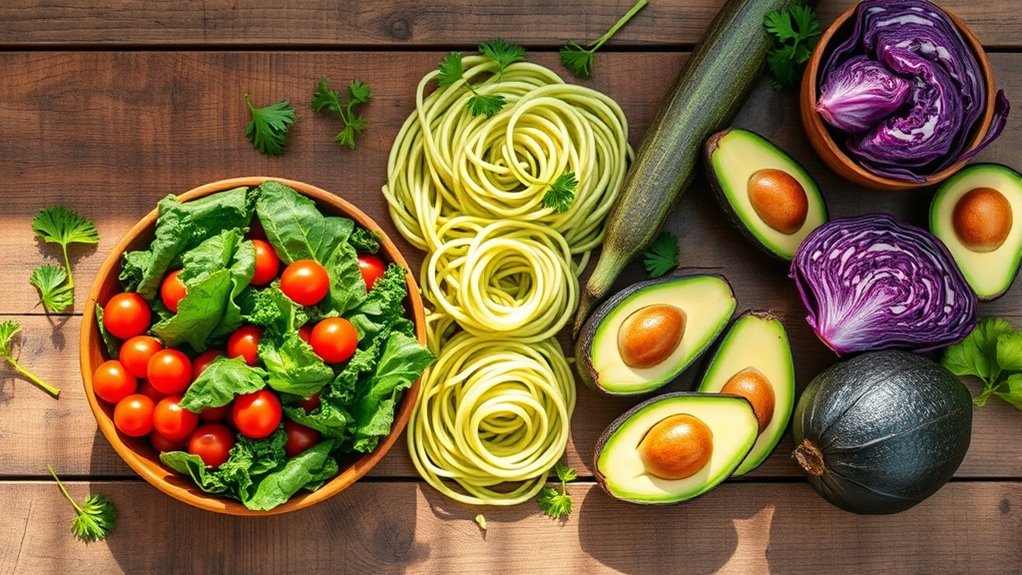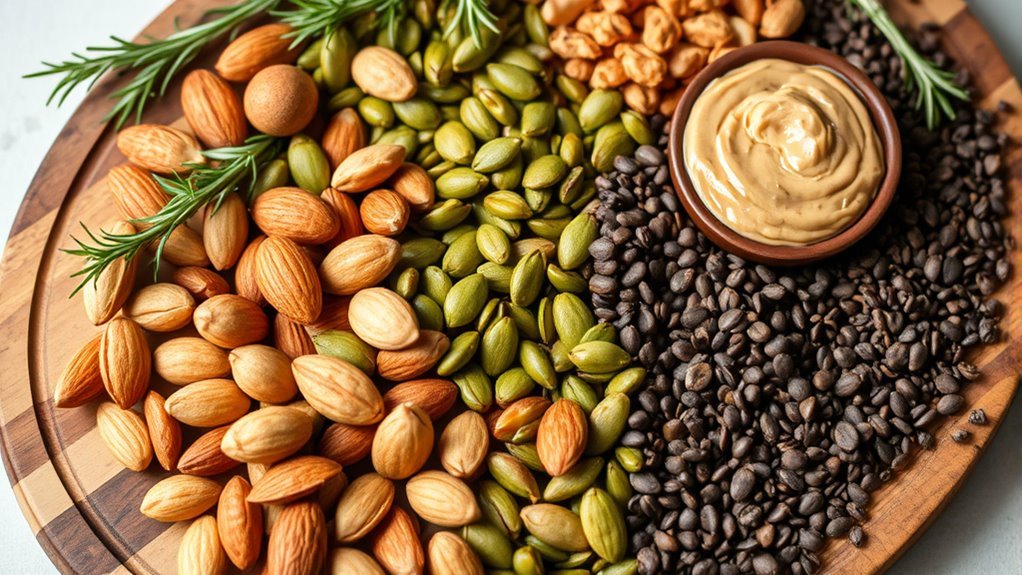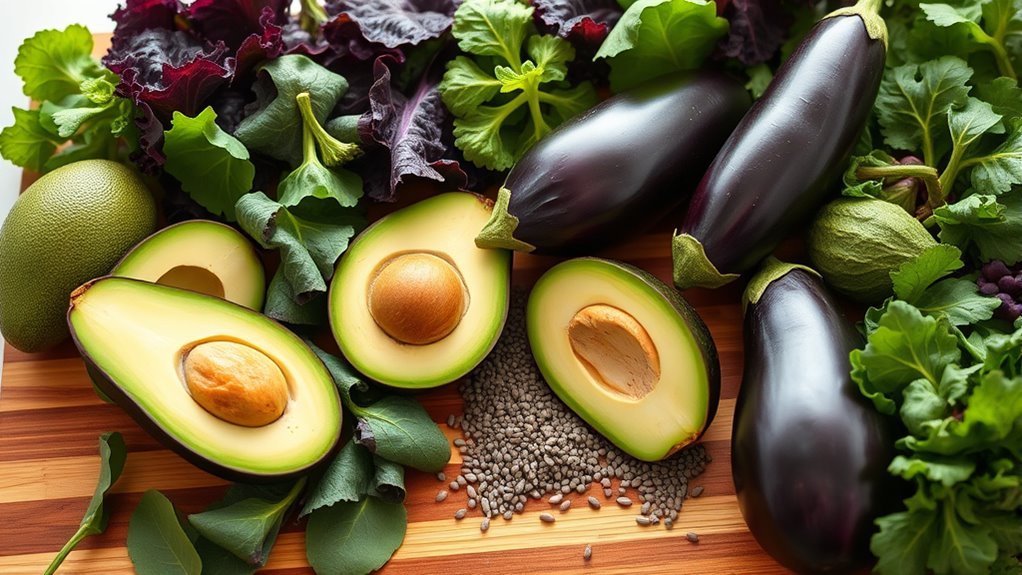To get fiber on a keto diet, focus on low-carb vegetables like spinach, kale, broccoli, and cauliflower, which provide essential nutrients without high carbs. Incorporate nuts and seeds, such as almonds, chia seeds, and flaxseeds, into your meals for added fiber and healthy fats. You can also consider fiber supplements like psyllium husk to meet your needs without increasing carb intake. There are plenty of creative ways to boost fiber in your keto meals to enhance your experience.
Understanding Fiber and Its Importance on Keto

When you’re following a keto diet, understanding fiber’s role is essential, as it can greatly impact your digestive health and overall well-being. There are two main fiber types: soluble and insoluble. Soluble fiber can help regulate blood sugar and lower cholesterol, while insoluble fiber aids in moving food through your digestive system. On a keto diet, incorporating fiber-rich foods can help prevent constipation and support gut health. Look for low-carb sources like chia seeds, flaxseeds, and certain nuts to boost your fiber intake. Balancing fiber with your daily macros can free you from digestive discomfort while still enjoying the benefits of a keto lifestyle. Prioritize fiber to enhance your diet and empower your health journey.
Low-Carb Vegetables That Pack a Fiber Punch

Incorporating low-carb vegetables into your keto diet can greatly enhance your fiber intake without derailing your carb count. Leafy greens and cruciferous veggies are excellent choices that provide essential nutrients and fiber. Here are some top picks to evaluate:
Boost your keto diet with low-carb vegetables for increased fiber and essential nutrients without the carb overload.
- Spinach: Packed with vitamins and low in carbs, it adds fiber without the guilt.
- Kale: This superfood is rich in fiber and antioxidants, making it a great addition to salads.
- Broccoli: A cruciferous veggie that’s not only filling but also a fiber powerhouse, as it contains approximately 3.6 grams of net carbs per serving, making it a perfect fit for keto diets.
- Cauliflower: Versatile and low-carb, it can be used in various dishes while boosting your fiber intake.
Nuts and Seeds: Keto-Friendly Fiber Sources

Although you might think of nuts and seeds as simple snacks, they’re actually powerful sources of fiber that can fit seamlessly into your keto diet. Incorporating various nut varieties like almonds, walnuts, and pecans can provide you with essential nutrients and fiber benefits. For seed options, consider chia seeds or flaxseeds, which are particularly high in fiber and low in carbs. These versatile foods can easily be added to salads, yogurt, or smoothies, giving you satisfying snack ideas that keep your fiber intake up. Plus, their healthy fats help maintain your energy levels and promote satiety. So, don’t overlook these nutrient-dense choices—they’re a tasty way to enhance your keto journey while boosting your fiber consumption. Additionally, nuts like almonds and walnuts are not only low in carbs but also nutrient-dense, making them perfect for a ketogenic lifestyle.
Incorporating Fiber Supplements Into Your Diet
How can you effectively boost your fiber intake on a keto diet? Incorporating fiber supplements can be a game-changer. They help you meet your fiber goals without compromising your carb limit. Here are some fiber supplement options to take into account:
- Psyllium husk: Great for digestive health; start with 1 teaspoon daily.
- Chia seeds: High in fiber and omega-3s; try 1-2 tablespoons per day. Their high fiber content aids digestion and promotes gut health.
- Ground flaxseed: Provides both fiber and healthy fats; aim for 1-2 tablespoons daily.
- Inulin: A prebiotic fiber; begin with 1 teaspoon and adjust as needed.
Always follow dosage recommendations on the packaging, and consult with a healthcare professional if you’re unsure. These supplements can help you maintain digestive health while enjoying the freedom of a keto lifestyle.
Creative Ways to Boost Fiber in Keto Meals
To effectively boost fiber in your keto meals, consider adding a variety of low-carb, high-fiber ingredients that not only enhance nutrition but also improve the overall texture and flavor of your dishes. Incorporate chia seeds or flaxseeds into your fiber rich smoothies for a creamy texture and a significant fiber boost. Avocado is another excellent choice, serving as a healthy fat source while adding fiber to salads or spreads. For keto friendly snacks, try roasted seaweed, which is both crunchy and nutrient-dense. You can also whip up veggie sticks, like celery or cucumbers, paired with a low-carb dip for extra crunch. Additionally, integrating low-carb vegetables into your meals not only boosts fiber but also helps you stay within your carb limits. By creatively integrating these options, you’ll enjoy delicious meals without sacrificing your fiber intake on a keto diet.
Frequently Asked Questions
Can I Get Enough Fiber Without Veggies on Keto?
Yes, you can get enough fiber without veggies on keto. Focus on fiber sources like chia seeds, flaxseeds, and psyllium husk, which are low in carbs and high in fiber. You might also consider keto alternatives like nuts and seeds, which can boost your fiber intake. Incorporating these options into your meals can help maintain digestive health while keeping your carb count low, giving you the freedom to enjoy your dietary choices.
What Are the Signs of Fiber Deficiency on a Keto Diet?
If you’re not getting enough fiber, you might notice symptoms like constipation, bloating, or fatigue. Notably, studies show that nearly 95% of people don’t meet their daily fiber intake. On a keto diet, fiber sources like nuts, seeds, and low-carb veggies are essential for digestive health. Incorporating these can help you maintain regularity and energy levels, so you can enjoy the freedom of a keto lifestyle without feeling sluggish or uncomfortable.
How Does Fiber Affect Ketosis?
Fiber plays an essential role in maintaining ketosis balance by promoting healthy digestion. When you consume fiber, it helps regulate your digestive system, preventing issues often associated with low-carb diets. This can enhance nutrient absorption and support your overall well-being. While fiber itself doesn’t directly affect ketosis, a well-functioning digestive system guarantees you’re effectively utilizing fats for energy, allowing you to enjoy the freedom of a keto lifestyle without discomfort.
Are There Any Keto-Friendly Fruits High in Fiber?
Yes, there are keto-friendly fruits high in fiber! You can enjoy options like avocados, which are low in carbs and packed with fiber, as well as raspberries and blackberries. These fruits not only provide great fiber sources but also fit well within your keto lifestyle. Incorporating these keto fruit options can help you maintain your fiber intake without compromising your carb limits, giving you the freedom to enjoy tasty, nutritious snacks.
Can I Consume Too Much Fiber on a Keto Diet?
Yes, you can consume too much fiber on a keto diet. While fiber intake is essential for digestive health, excessive amounts can lead to bloating, gas, or cramping. It’s vital to balance fiber sources, like low-carb vegetables and nuts, with your overall carb intake. Aim for around 25-30 grams of fiber daily, adjusting based on how your body responds. Listen to your body and find the right balance to enjoy your keto journey.
Frequently Asked Questions about Getting Fiber on a Keto Diet
1. Why is fiber important on a keto diet?
Fiber plays a crucial role in digestive health, helping to maintain regular bowel movements and prevent constipation, which can be a common issue when following a low-carb diet like keto. Additionally, fiber can help you feel fuller for longer, aiding in appetite control and overall weight management. It also supports gut health by promoting the growth of beneficial bacteria.
2. What are the best fiber sources for a keto diet?
Some excellent fiber sources for a keto diet include non-starchy vegetables like spinach, broccoli, and kale, which are low in carbs but high in fiber. Additionally, avocados are a fantastic option, providing both healthy fats and fiber. Nuts and seeds, such as chia seeds, flaxseeds, and almonds, are also great choices, as they are low in carbs and high in fiber content. Lastly, consider using fiber supplements like psyllium husk if you’re struggling to meet your fiber needs through food alone.
3. How much fiber should I consume on a keto diet?
The recommended daily intake of fiber varies, but most health experts suggest aiming for at least 25 grams per day for women and 38 grams for men. On a keto diet, it’s essential to ensure that your fiber intake comes from low-carb sources to maintain ketosis. Tracking your fiber intake can help you stay within the recommended range while adhering to your carb limits.
4. Can I get enough fiber without eating grains on a keto diet?
Absolutely! While grains are a common source of fiber in many diets, they are not necessary for achieving adequate fiber intake on a keto diet. By focusing on low-carb vegetables, nuts, seeds, and avocados, you can easily meet your fiber needs without including grains. Additionally, incorporating fiber-rich supplements like psyllium husk can help fill any gaps.
5. What are some tips for increasing fiber intake on a keto diet?
To increase your fiber intake on a keto diet, start by incorporating a variety of non-starchy vegetables into your meals. Aim to fill half your plate with these fibrous foods. Snacking on nuts and seeds can also boost your fiber intake significantly. Consider adding chia or flaxseeds to smoothies, yogurt, or salads. Lastly, if you’re finding it challenging to meet your fiber goals through food alone, look into fiber supplements, such as psyllium husk, to help you reach the recommended levels.
References
- https://www.wikihealth.org/wiki/Fiber
- https://www.ncbi.nlm.nih.gov/pmc/articles/PMC6313440/
- https://www.healthline.com/nutrition/keto-diet-fiber
- https://www.health.gov/dietaryguidelines/2015/guidelines/appendix-5/
- https://www.hsph.harvard.edu/nutritionsource/fiber/
- https://www.cdc.gov/nutrition/data-statistics/know-your-fats.html


